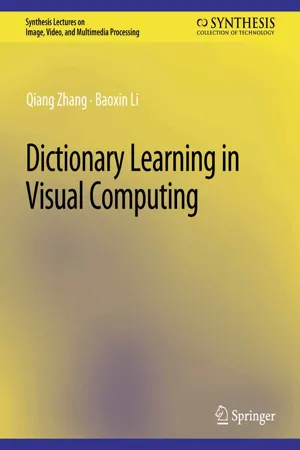
- English
- PDF
- Available on iOS & Android
eBook - PDF
Dictionary Learning in Visual Computing
About this book
The last few years have witnessed fast development on dictionary learning approaches for a set of visual computing tasks, largely due to their utilization in developing new techniques based on sparse representation. Compared with conventional techniques employing manually defined dictionaries, such as Fourier Transform and Wavelet Transform, dictionary learning aims at obtaining a dictionary adaptively from the data so as to support optimal sparse representation of the data. In contrast to conventional clustering algorithms like K-means, where a data point is associated with only one cluster center, in a dictionary-based representation, a data point can be associated with a small set of dictionary atoms. Thus, dictionary learning provides a more flexible representation of data and may have the potential to capture more relevant features from the original feature space of the data. One of the early algorithms for dictionary learning is K-SVD. In recent years, many variations/extensionsof K-SVD and other new algorithms have been proposed, with some aiming at adding discriminative capability to the dictionary, and some attempting to model the relationship of multiple dictionaries. One prominent application of dictionary learning is in the general field of visual computing, where long-standing challenges have seen promising new solutions based on sparse representation with learned dictionaries. With a timely review of recent advances of dictionary learning in visual computing, covering the most recent literature with an emphasis on papers after 2008, this book provides a systematic presentation of the general methodologies, specific algorithms, and examples of applications for those who wish to have a quick start on this subject.
Tools to learn more effectively

Saving Books

Keyword Search

Annotating Text

Listen to it instead
Information
Table of contents
- Cover
- Copyright Page
- Title Page
- Dedication
- Contents
- Acknowledgments
- Figure Credits
- Introduction
- Fundamental Computing Tasks in Sparse Representation
- Dictionary Learning Algorithms
- Applications of Dictionary Learning in Visual Computing
- An Instructive Case Study with Face Recognition
- Bibliography
- Authors' Biographies
Frequently asked questions
Yes, you can cancel anytime from the Subscription tab in your account settings on the Perlego website. Your subscription will stay active until the end of your current billing period. Learn how to cancel your subscription
No, books cannot be downloaded as external files, such as PDFs, for use outside of Perlego. However, you can download books within the Perlego app for offline reading on mobile or tablet. Learn how to download books offline
Perlego offers two plans: Essential and Complete
- Essential is ideal for learners and professionals who enjoy exploring a wide range of subjects. Access the Essential Library with 800,000+ trusted titles and best-sellers across business, personal growth, and the humanities. Includes unlimited reading time and Standard Read Aloud voice.
- Complete: Perfect for advanced learners and researchers needing full, unrestricted access. Unlock 1.4M+ books across hundreds of subjects, including academic and specialized titles. The Complete Plan also includes advanced features like Premium Read Aloud and Research Assistant.
We are an online textbook subscription service, where you can get access to an entire online library for less than the price of a single book per month. With over 1 million books across 990+ topics, we’ve got you covered! Learn about our mission
Look out for the read-aloud symbol on your next book to see if you can listen to it. The read-aloud tool reads text aloud for you, highlighting the text as it is being read. You can pause it, speed it up and slow it down. Learn more about Read Aloud
Yes! You can use the Perlego app on both iOS and Android devices to read anytime, anywhere — even offline. Perfect for commutes or when you’re on the go.
Please note we cannot support devices running on iOS 13 and Android 7 or earlier. Learn more about using the app
Please note we cannot support devices running on iOS 13 and Android 7 or earlier. Learn more about using the app
Yes, you can access Dictionary Learning in Visual Computing by Qiang Zhang,Baoxin Li in PDF and/or ePUB format, as well as other popular books in Technology & Engineering & Electrical Engineering & Telecommunications. We have over one million books available in our catalogue for you to explore.